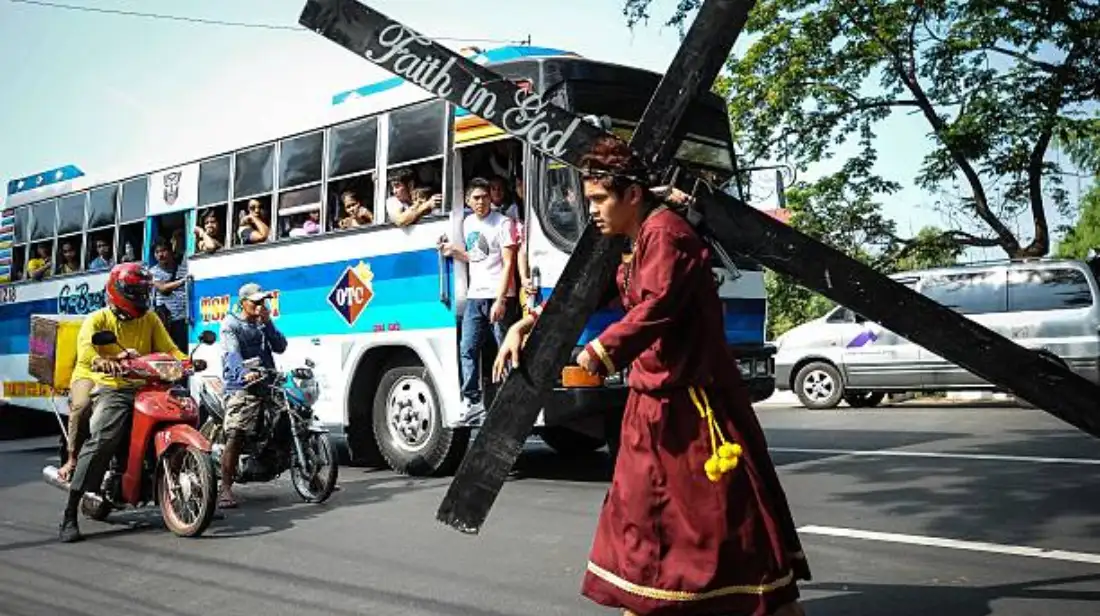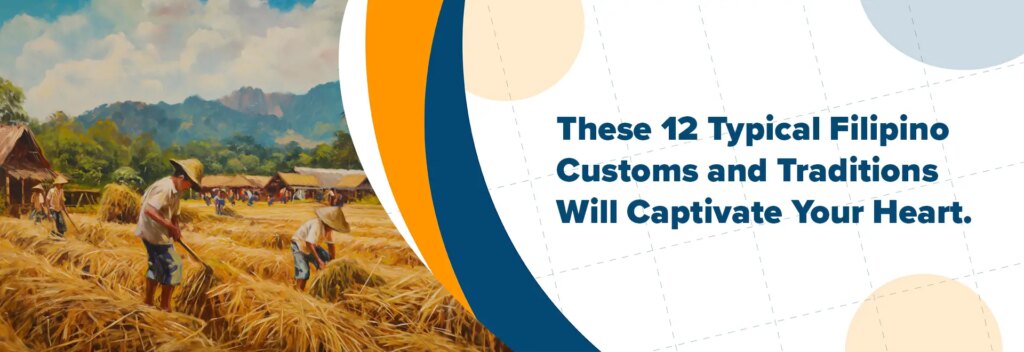
12 Typical Filipino Customs and Traditions That Will Captivate Your Heart
“Mano po,” says a 9-year-old girl who just arrived from school to her grandmother.
If you heard this, how would you react? This expression is an act of getting an elderly’s hand and bringing it to a young’s forehead signifying respect for them. Strange, isn’t it?
The Philippines is well-known not just for its historic places or beautiful tourist destinations but for its cultural heritage too. The country is rich in diverse culture bringing along a unique blend of Filipino customs and traditions that are only experienced in the Philippines.
With a lot of various Filipino customs and traditions, beliefs, and religions that vary from one place to another, these customs are all interconnected which capture the heart of a non-Filipino citizen in the country. Wherever you are in the Philippines, you will clearly see a lot of Filipino customs and traditions that are unique to the world.
A Glimpse at Filipino customs and traditions
Filipino customs and traditions begin at home. Elders teach children good manners and the right conduct. Children learn to be respectful of everyone through the use of polite words when talking. They also learn to be responsible because they are taught to do household chores as part of their upbringing.
Filipino customs and traditions differ in every aspect: religion, superstitious beliefs, daily life, relationships, and the like. These customs and traditions have been part of Filipino culture because of the influence of other races in the history of the Philippines.
Despite the emergence of modern technology and globalization, Filipino customs and traditions remain undying. Over the years, there has been a great advancement in terms of modernization, but the unique practices that were taught from the old generation to the current one are still strong and well-preserved.
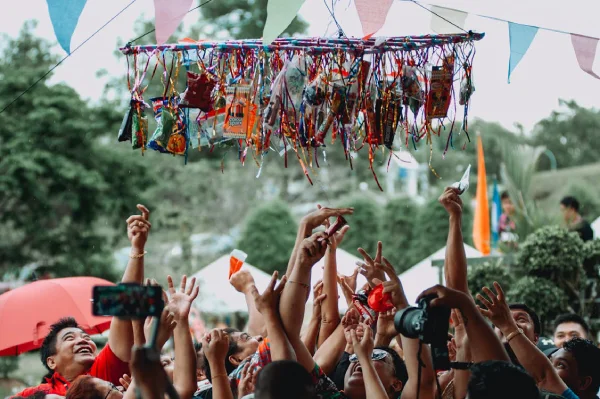
Filipino customs and traditions are symbols of Filipino resilience. Filipinos rely mostly on beliefs and traditional methods rather than taking advantage of advancement. This makes Filipinos recognized for being resilient and strong.
If you are not familiar with Filipino customs and traditions, this article will give you ideas about them and share insights to make you imagine their uniqueness. Keep reading until the end of this article.
Unique Filipino customs and traditions
A typical Filipino home or community portrays various customs and traditions that are truly remarkable. Here are some of the unique Filipino customs and traditions that will surely capture your heart.
Respect elders
One of the most practiced Filipino customs and traditions is the “Pagmamano” or grabbing the hand of the elderly or someone older and bringing to the forehead and saying “Mano po.” This is the best sign of respect a younger generation can show to those who are older than them.
In provinces speaking Tagalog, the words “po” and “opo” or “ho” and “oho” are very common. In areas, however, like the Visayan regions, these words are not uttered when asking for an elder’s hand.
A kiss on the forehead of an elderly person is also recognized as another respectful gesture in some areas of the country. This gesture means deep respect for the elderly.

Hospitality
You are not in a Filipino home if you are not well-entertained or well-accommodated. A typical Filipino is hospitable. Whenever a visitor visits a Filipino home, you are treated with the utmost respect.
In the old days, whenever there were visitors, all new cutlery and utensils were taken out of the kitchen cabinets so that visitors could use them during meals. The same is true with the newest bedding at home. Visitors who sleep over are served with the newest things in the house.
In rural areas, whenever there are guests, there is always a feast. The host family serves delicious food like native chicken or newly harvested rice, when in fact in their usual days, they don’t even do this at home.
Sometimes, when strangers lose their way, a typical Filipino family would accommodate them – give them water to drink, offer them food, etc. The warm accommodating spirit of the Filipinos is truly a sign of their true hospitality.
Close Family Ties
It is normal for Filipino families to bond closely especially on special occasions like birthdays, weddings, baptisms, fiestas, family reunions, Christmas seasons, All Saints’ and Souls’ Day, Holy Week, and even on normal days.
Having close family ties is part of typical Filipino customs and traditions that have been passed on from their ancestors to the latest generation.
Not only do families bond closely, but they also take care of and support one another in difficult times. No matter how much of a misunderstanding arises, “blood is always thicker than water.” Loyalty to the family is important in every Filipino’s heart.
Bayanihan
“Bayanihan” symbolizes unity in the Philippines. This usually happens in rural and remote areas of the country. People in the community lend their helping hands to those who need to transfer their house from one place to another.
The act of bayanihan is that men carry a nipa hut or a “bahay-kubo” and bring it to the desired place of transfer. This act does not require anything in exchange. A simple “salu-salo” or small meal after the bayanihan is enough to express appreciation and gratitude to those who helped.
Nowadays, bayanihan is rarely practiced, but it is culturally recognized only in the Philippines.
Superstitious Beliefs
Superstitious beliefs are very common in the Philippines and most people rely on these beliefs based on what they have experienced.
These beliefs have grown throughout the country and aim to stop someone from doing something or warn someone about an incident. These beliefs also signify an omen to prevent people from being involved in something.
What are the superstitious beliefs in your country? In the Philippines, there are too many to mention.
- If you see a black cat passing in front of you, it is a sign of a bad omen so you have to be careful as it is your unlucky day.
- If a butterfly arrives in your house, they may signify a soul of your relatives or loved ones visiting you at home.
- Do not sweep the floor at night because luck will vanish.
- When you dream about pigs or human feces, it means you will have money.
- When you dream about floods or heavy and rough water, a big problem will come into your life.
- If you are injured on Good Friday, your wound won’t heal easily.
- Do not eat with plates put on top of each other because you will have more than one wife or husband.
- If you sing while cooking, you will marry an old man or woman.
- Do not go straight home after attending a wake because they say the dead person’s soul will go with you. You have to bring something from the wake and create smoke outside your house and put that something there.
- Sukob – a Filipino term referring to the marriage of siblings in the same year. Siblings should not get married in the same year because it might lead to the death of an immediate family member.
- Do not fit your wedding gown or be with the groom before the wedding because it might not push through.
- If one candle dies first during a wedding ceremony, it means that the married couple will have a difficult life together.
- Serve noodles during birthdays and New Year to have a longer life.
- Do not touch or destroy the dwarves’ house (a small mound believed to be the home of elves) because they will be angry and you will get sick until you die.
- Knock on wood if you talk about something that you wish would not happen.
- Bite a piece of wood when you wake up in the morning if you have a nightmare to stop the curse.
- If one tooth is broken in your dream, it means a family member is going to die.


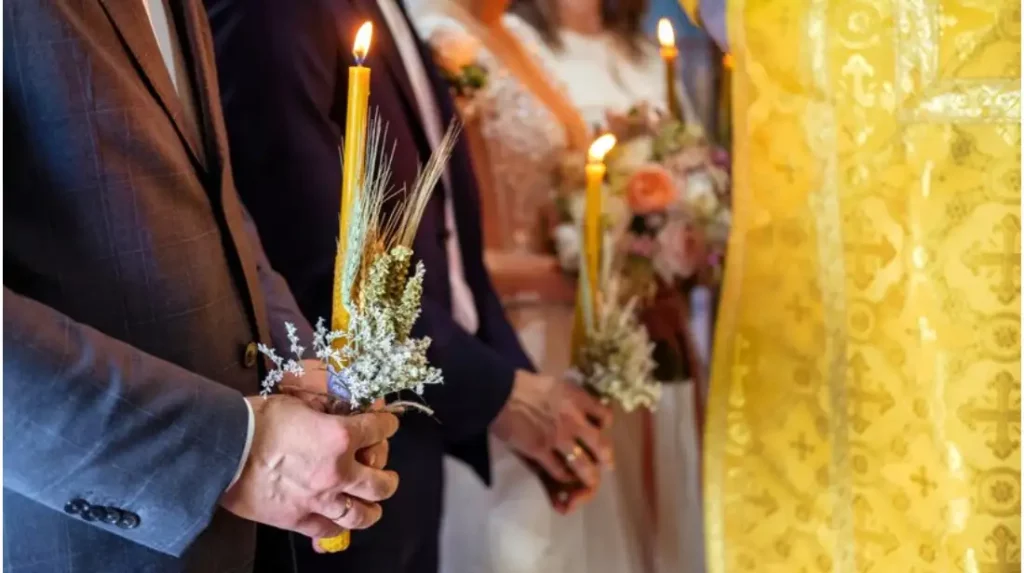
- Don’t sleep lying flat with both your hands on top of your stomach as it means you are cursing yourself.
- When you bite your lips or tongue, somebody must be thinking of you or talking about you.
- An itchy palm means money or wealth will be yours soon.
Courtship and engagement
The traditional style of courtship in the Philippines considered the most conservative of all Filipino customs and traditions is “Harana.” Harana, as translated into English is “serenade.”
When a man is courting a woman, he usually brings a guitar with him and sings for his dearest. The woman would usually stay by the window and listen to the song.
In modern days, “paghaharana” isn’t practiced anymore, but engagement especially in remote areas is still common. The family of the man usually brings food to the place of the woman and has a feast, giving both families the chance to discuss the future of the couple.
Use bare hands when eating
You can easily identify a Filipino if you see them eating with their hands. This is a very common gesture in the Philippines and is typical in some Filipino homes. This also happens in a boodle fight, where the food is served on a table and people pick what they want using their hands.
Fiestas and Grandest Festivals
Fiestas are celebrations of patron saints in the Philippines. Every area in the country, even the smallest village, has an annual fiesta celebration where various activities are held. Street parades are one of the most popular activities during fiesta celebrations.
The Philippines is also rich in the grand festivals that are celebrated in various big cities and provinces.
Sinulog Festival in Cebu, for example, is considered the mother of all festivals in the country. There are numerous festivals in the country that are eagerly visited by both local and foreign tourists.
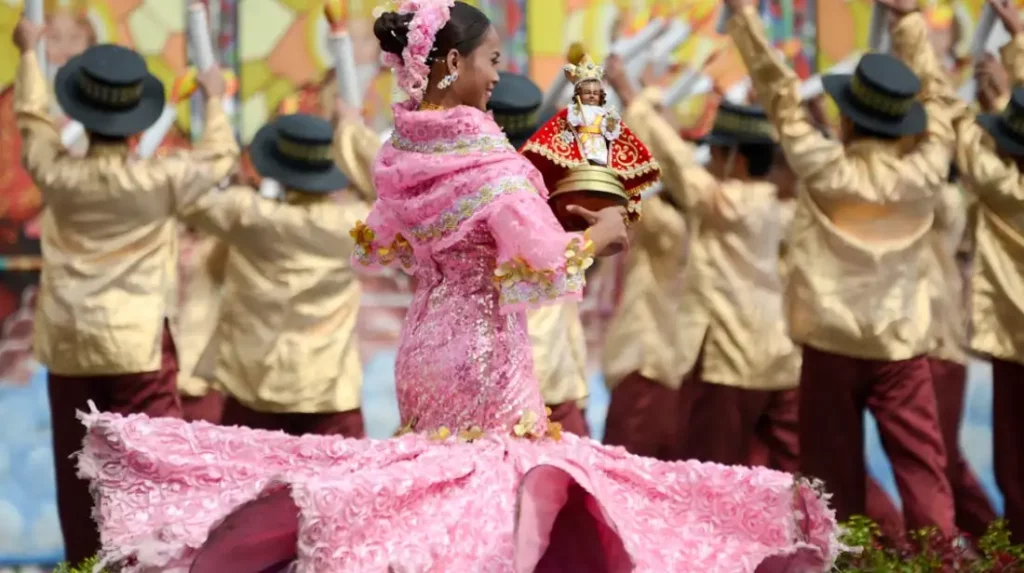
Christmas Celebrations
Christmas in the Philippines is unique and memorable. Christmas is the time when Filipino families gather and celebrate together. Family reunions happen during this time. A typical family would celebrate it simply as long as they are complete.
“Simbang gabi” is an icon of Christmas time in the Philippines. As one of the Filipino customs and traditions, people go to Church and attend dawn masses from the 16th of December until the 24th to celebrate the birth of Jesus Christ. They say that if you complete the 9 nights of Simbang Gabi, your wish will come true.
“Noche Buena” is a meal eaten at midnight on December 24. Filipino families exchange gifts and share memorable stories with their loved ones. Spaghetti and roasted pig (lechon) will never be absent from the meals.
The Christmas season in the Philippines can be felt from September until the end of December. People greet one another with wonderful greetings and well-wishes. It is the only country where Christmas is celebrated longer.
Holy Week
It has been a tradition in the Philippines to celebrate Holy Week in honor of Jesus Christ’s death when He was crucified. Filipinos go to churches and bring flowers or homemade coconut leaves formed as a cross and blessed with holy water.
Some people fast, and some offer sacrifices as penance. Others walk a thousand miles to visit a holy place. Through their sacrifices, they believe that Christ is with them.
In some provinces, there is a reenactment of what happened during Christ’s suffering until He was crucified. Many devotees would volunteer to be crucified as well as part of their penance.
Araw ng mga Patay
The “Day of the Dead” as translated, is an occasion when Filipinos visit the graves of their loved ones. November 1 and 2 every year are special days for the departed ones. During this time, not only do family members visit the cemetery but horror and creepy stories emerge.
Pasalubong
Souvenirs are an important part of every Filipino’s vacation. “Pasalubong” is a term used to refer to souvenirs from the Philippines. The most common pasalubong from the Philippines are delicacies like banana chips and dried mangoes. Some are T-shirts, keychains, ref magnets, and mugs.
Bring a pasalubong to your family back when you visit the Philippines.
There are numerous Filipino customs and traditions that still exist until now. A typical Filipino knows a lot about the country’s customs and traditions. The practices have been passed on from generation to generation.
However, with the advent of modernization, some of these have not been practiced anymore, especially in civilized areas. Despite this, the essence of a true Filipino remains resilient.
What captured your heart?
You were surely amazed by the Filipino customs and traditions introduced in this article, but what captured your heart? Do you want to experience it? What Filipino customs and traditions are similar to your country’s? Feel free to share them with us here.


